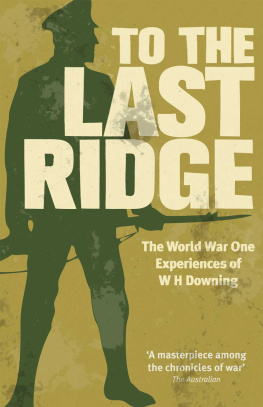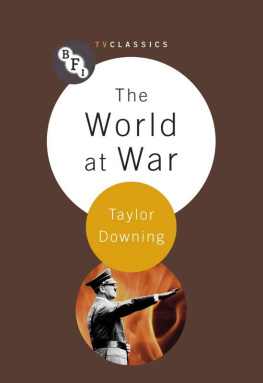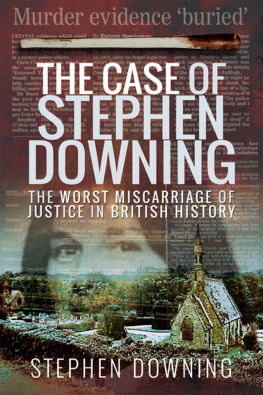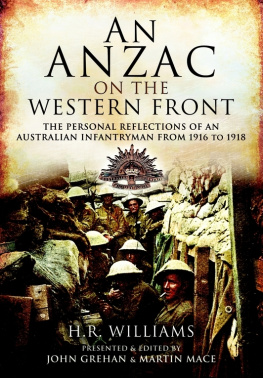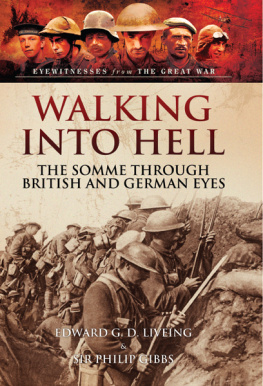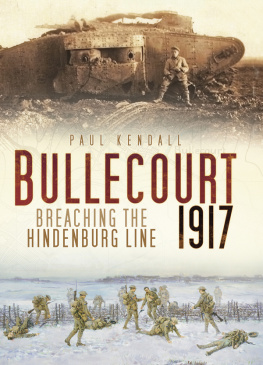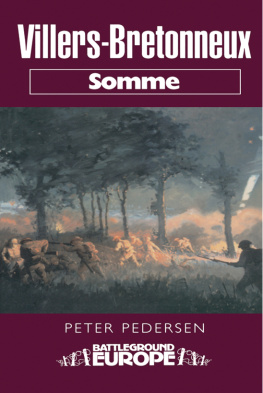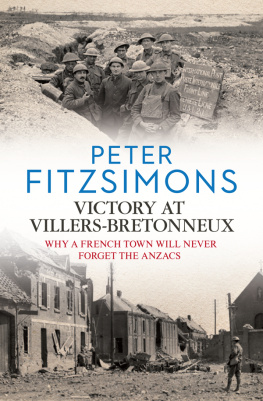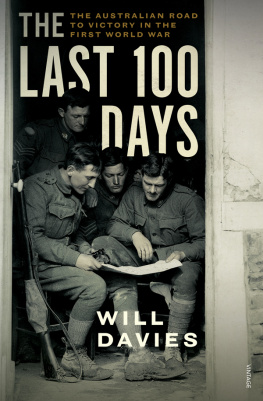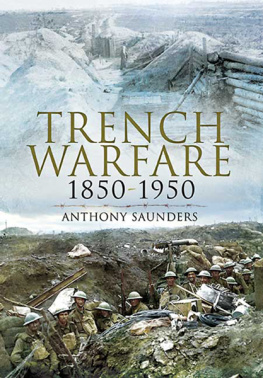INTRODUCTION
William Downing
M y father, Walter Hubert Downing (Jimmy to his friends), was born in 1893 at Portland in Victoria. He hated having his photo taken. Due to this, and because at different times both his house and mine were destroyed by fire, there are only a few photos of him in existence today. One of them is a family photo. His sister, my aunt Gwen, said they had got him up nicely when he disappeared. He got into a fight with some of his colleagues, so he appeared in the photo with a hastily smoothed-down collar and a very pugnacious look on his face.
As the youngest boy, he was rather spoilt by his sisters, and could be thoughtless. Gwen and Cath used to recall how he would hand them his creams to be washed, dried and pressed on the morning of the day he was to play in a cricket match. He went to Scotch College and then began to study law at Queens College, University of Melbourne. He won a University Blue in lacrosse and edited the Melbourne University student magazine.
When World War I broke out he tried to enlist, but he was too short and was rejected eight times, thereby missing Gallipoli. For the ninth occasion he had some friends hoist him up by the shoulders and weights were tied to his feet to stretch him. Then he was hurriedly measured, before he reverted to his usual height. He was found to be just tall enough and was finally enlisted on 30 September 1915.
Jimmy was put in the 7th Battalion of the Australian Imperial Forces (A.I.F.), and sent to Egypt for his final training. There he was offered a discharge because of a dislocation and cracked bone in his right arm, which he declined. He was transferred to the 57th Battalion, in which he served for the rest of the war. In mid-1916 he went into action in France, where he attained the rank of sergeant. He was offered a commission but turned it down, as that would have meant being separated from the men he had fought alongside. At Polygon Wood his platoon was advancing under cover of an artillery barrage, but the barrage fell short, and shells were exploding among his men. He calmed their panic and organised a retreat to a safer place. For his calm action in these circumstances he was awarded the Military Medal.
Three years of trench warfare took a heavy toll on his health, and in 1918 he applied for leave on medical grounds. He believed he had lost a great deal of weight, but one of the officers who considered his application rejected it with the comment: He was always a skinny little runt. Fortunately, the war ended soon after this and he was able to take leave in Italy.
Jimmy had a Rowntrees chocolate advertisement, in the form of a scroll with a very impressive seal, which he had torn from a box. Whenever he got on a train in Italy, he would flash this scroll at the conductor, who would never look at it more closely, and so was able to travel to Rome without having to pay anything.
In Rome he enjoyed himself, and when the time came to return to his unit he decided to stay on and blame a nearby earthquake for his delayed return. But he was tipped off that he had been spotted by the authorities, and that in any case the earthquake story would not hold water. He needed to get back to his unit in France without going through passport control at the border. He travelled up from Rome with some French troops, one of whom kindly lent him parts of his uniform so he could line up and receive a wine ration, a benefit unknown in the Australian army. Just outside Milan, Jimmy left the train and borrowed a bakers cart, pushing it into the city as a cover and abandoning it in the main square where its owner would be able to find it. He then travelled by foot and trams from village to village across northern Italy into Southern France, avoiding border check points and using his Rowntree scroll to pay his fares.
But his unit wasnt where he had left it. In fact, it was no longer in France. Somehow Jimmy managed to hitch his way through France and across the English Channel, rejoining his unit in England. The paperwork was obligingly adjusted and there was no fuss about his absence.
Back in Melbourne in 1919, he used his repatriation money to enrol at Queens and complete his law degree. After graduating in 1920, he opened a practice in partnership with a fellow student, Ted Williams, but this was soon dissolved and Jimmy joined his former divisional commander, Brigadier-General Harold Pompey Elliott, to establish the firm of H.E. Elliott and Downing. In 1929 Jimmy married a beautiful young woman, Dorothy Louise Hambeleton, known to her friends and family as Pip. They were lucky enough, because of the Depression, to be offered a large house at Ricketts Point for a peppercorn rent, and the three of us (this was soon after I was born in 1930) moved there. I acquired three younger brothers: James, John and David. We ran poultry in the grounds. My fathers income diminished almost to nothing and we would swap eggs for the vegetables grown by unemployed men on some empty land at the back of the house.
Elliott had been under tremendous strain during the war and with the stress of the Depression he broke and committed suicide. The press was generally considerate even the notorious Melbourne Truth and simply reported that Elliott had died. The exception was Smiths Weekly, which blazed the headline General Elliott Commits Suicide. This gave

